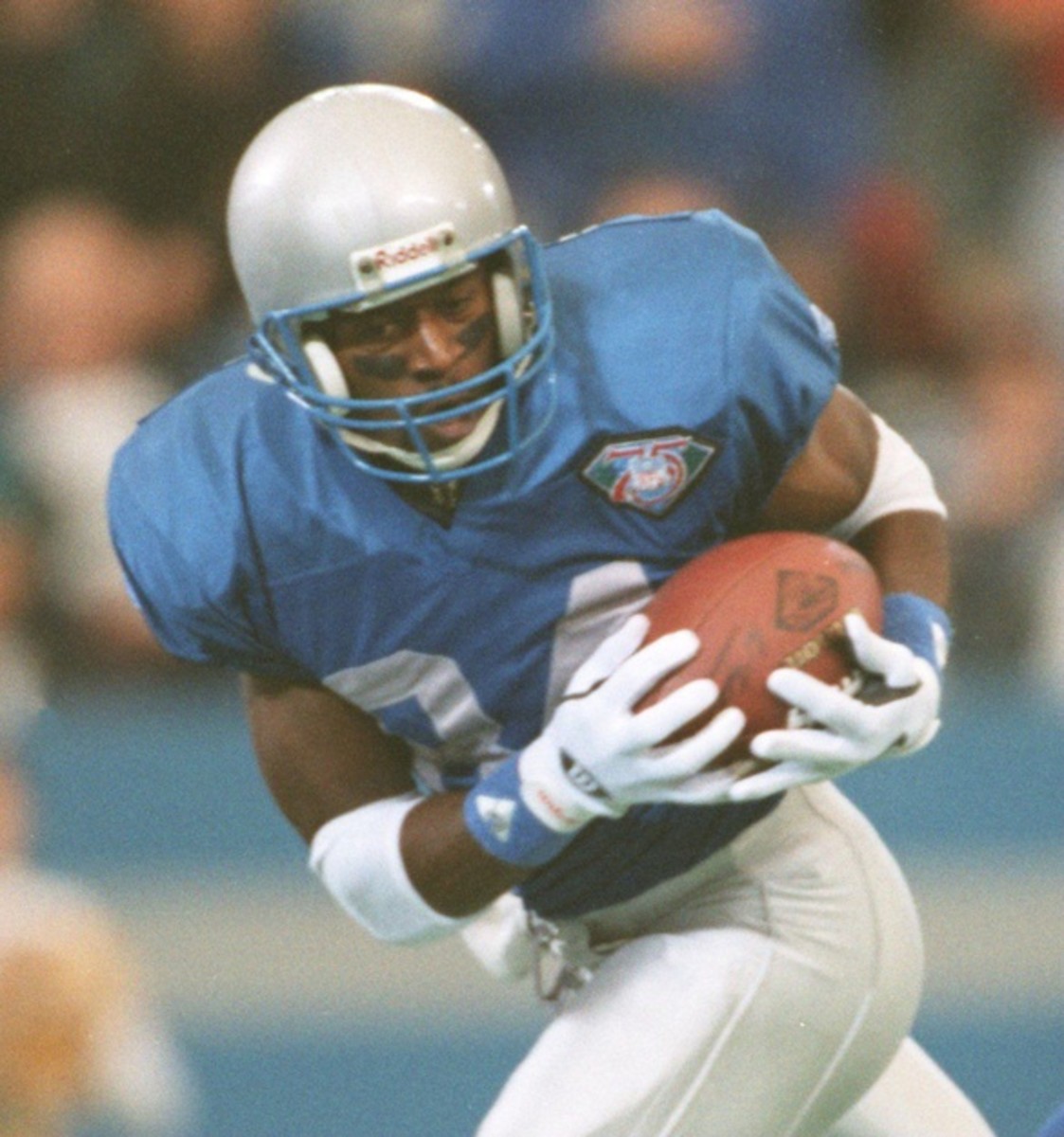Top 10 Draft Picks in Lions History
There’s been beauty in the struggle.
Although the Detroit Lions have been infamous for their mishaps in the NFL Draft, there have been instances where they’ve hit the jackpot.
So, who are the best of the best when it comes to the Lions in the NFL Draft?
Here are the 10 best draft picks in Detroit Lions history.
Honorable mention: Jason Hanson, kicker, Washington State
Drafted: No. 56 overall in 1992
A kicker in the top 10? Close, but no cigar. This decision comes with the fact that Hanson was a mainstay in the organization for two decades.
Hanson was a four-time All-Pro, and was incredibly consistent for Detroit during his career.
Special teams woes can haunt teams. In Hanson, the Lions didn’t have to worry about that. Hanson had two seasons in which he made over 90 percent of his kicks, and is synonymous with great kicking. He nearly cracks the top 10, but there were too many options at the skill positions to justify him cracking the list.
10.) Robert Porcher, defensive end, South Carolina State
Drafted: No. 26 overall in 1992
Porcher is a name that not many casual fans will know. However, his stats jump off the page.
He spent 10 years anchoring the Lions’ defensive line. Porcher is the Lions’ all-time leader in career sacks with 95.5, and he had five seasons of double-digit sacks.
Porcher played all 16 games in eight seasons. Although the Lions were never great during his tenure -- which is part of the reason why he’s not as well known to fans of this generation -- there’s no doubting the impact he had on the organization.
9.) Matthew Stafford, quarterback, Georgia
Drafted: No. 1 overall in 2009
Picking first overall is easy enough, right? Regardless of the feelings surrounding some of the top picks in recent memory (i.e. Sam Bradford, Jameis Winston), the Lions nailed this one.
In Stafford, Detroit got its franchise quarterback for the next decade. Despite a bit of a rocky start, in which Stafford dealt with injuries, this pick is one that Lions fans will remember for a long time. Stafford displayed grit and toughness late in his tenure that endeared him to the city.
Stafford did what No. 1 overall picks should do. He performed, and made it impossible to think of anyone else leading the Lions for the better part of his tenure.
Part of his legacy will be the fact that he never took Detroit to the promised land -- or even won a playoff game. But, this pick is definitely one of the great ones.
8.) Chris Spielman, linebacker, Ohio State
Drafted: No. 29 overall in 1988
Now a member of the organization's front office, Spielman is still a big member of the Lions’ history. He was a heck of a player in his day. After being drafted as an early second-round pick, Spielman began a career in which he was a four-time Pro Bowler and a one-time first-team All-Pro.
Spielman spent the first eight years of his career in Detroit, before finishing with two seasons in Buffalo. In his time with Detroit, Spielman made 1,363 tackles, which ranks first in team history. His toughness and grit are synonymous with the toughness of Detroit.
7.) Billy Sims, running back, Oklahoma
Drafted: No. 1 overall in 1980
Sims was electric in his first two seasons in Detroit. As a rookie, he scored 13 touchdowns, and ran for over 1,300 yards, as he was named AP Offensive Rookie of the Year. He followed that effort with a statistically better one, as he ran for 1,437 yards.
Sims then got bit by the injury bug, though, which ended his career after just five seasons. After making his third Pro Bowl in 1983, Sims suffered a knee injury the following season that ended his career immediately. Had he not had such a short career, it’s interesting to think about where he’d be on this list.
6.) Herman Moore, wide receiver, Virginia
Drafted: No. 10 overall in 1991
Moore was a big, physical receiver. As a rookie, he made just 11 catches for 135 yards. However, he had a big second-year jump, as those numbers shot up to 51 catches for 966 yards. He finally crossed the 1,000-yard plateau in his fourth year.
Moore had three seasons of 100 catches or more. He ranks second all-time in receptions, behind only one person who is still to be seen on this list. Moore’s production went down as his career progressed, as he made just four catches in three games in his final season in Detroit in 2001.

5.) Lem Barney, defensive back, Jackson State
Drafted: No. 34 overall in 1967
Barney was as good a defensive back as you can get in the draft. As a rookie, he had 10 interceptions, three of which he returned for touchdowns. He was the 1967 AP Defensive Rookie of the Year, and he made seven Pro Bowls.
Barney was also good on special teams at times, scoring two punt returns and one kick returns. He ranks second in Lions history in interceptions with 56, behind only Dick LeBeau. Barney was inducted into the Pro Football Hall of Fame in 1992.
4.) Charlie Sanders, tight end, Minnesota
Drafted: No. 74 overall in 1968
As a rookie, Sanders made a sizeable contribution with 533 yards on 40 receptions. He never crossed the 1,000-yard mark for receiving yards, but consistently hovered around 500 until the final year of his career.
Sanders ranks seventh in team history in receptions with 336. He stayed relatively healthy for the majority of his career. As a tight end, his impact may be overlooked at times. He was inducted into the Pro Football Hall of Fame in 2007.
3.) Alex Karras, defensive tackle, Iowa
Drafted: No. 10 overall in 1958
Karras was a four-time Pro Bowler and a three-time first-team All-Pro. He was also a member of the NFL’s 1960s All-Decade Team. He was a force up the middle, and played on some of the better teams in Lions history.
Karras was also an actor after football, but it was his contributions on the field that made him famous. He initially missed out on Hall of Fame honors, but was elected posthumously in 2020 as part of the NFL’s centennial class.
2.) Calvin Johnson, wide receiver, Georgia Tech
Drafted: No. 2 overall in 2007
Johnson was an athletic specimen. At 6-foot-5, he was a problem for defenses the second he stepped on the field. The problem was, at least for the early stages of his career, subpar quarterback play made it tough to get him the ball.
Once Stafford got his feet under him, Johnson became a true force. Johnson rattled off seven seasons of at least 1,000 receiving yards, including six in a row to end his career. In 2012, Johnson set the NFL’s all-time record for receiving yards in a season with 1,964.
Following the 2015 season, Johnson hung up the cleats. There’s no doubt he had more to give, but the Lions’ lack of success played a major factor in the decision.
Nowadays, Johnson and the organization are in murky waters. Having been elected as a first-ballot Pro Football Hall of Famer, maybe a reunion is in order -- and sooner rather than later.
1.) Barry Sanders, running back, Oklahoma State
Drafted: No. 3 overall in 1989
What could’ve been? Sure, Sanders ran for 15,269 yards in his 10 seasons with the Lions. But, he surprised everyone by hanging up the cleats prematurely, just like Johnson. If Detroit was more competitive, maybe he would've stuck around a little bit longer.
Sanders is the greatest Lions draft choice for what he did in his time with the team. He ran for at least 1,000 yards in every season he played, scoring at least 10 touchdowns in six of those seasons. Sanders was a blast to watch and impossible to contain for defenses. But, he certainly had more in the tank.
More from SI All Lions:
Roundtable: Is Jared Goff the Best Quarterback in NFC North?
Sports Book Predicts Lions to Finish with Worst Record in 2021
